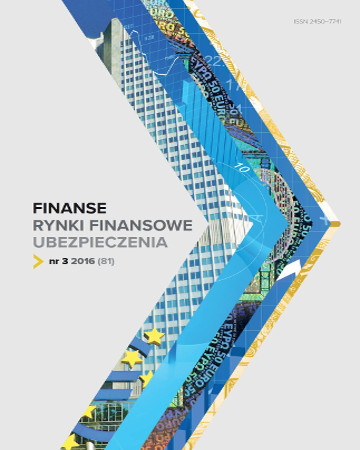
ISSN: 2450-7741
eISSN: 2300-4460
OAI
DOI: 10.18276/frfu.2016.4.82/2-11


Issue archive /
4/2016
Global Reporting Initiative (GRI) and its implications on portfolio values in CEE countries – environmental aspect
| Authors: | Bogna Janik |
| Keywords: | Global Reporting Initiative indices: CEERIUS VONIX RESPECT sustainability in finance |
| Data publikacji całości: | 2016 |
| Page range: | 8 (147-154) |
Abstract
Objective – The main objective of the article is to assess the conformity of the selection process to the RESPECT, CEERIUS and VONIX portfolios with the GRI guidelines and the profitability as well as investment effectiveness of the above mentioned portfolios. Research methodology – the article presents a quantitative and qualitative analysis of the passive portfolios of socially responsible companies’ shares within the ESPECT, CEERIUS and VONIX indices. The quantitative analysis encompasses the years between 2010 and 2015 and evaluates the profitability and effectiveness of the above mentioned indices against conventional ones. Within the scope of the qualitative analysis special attention was put on the components of the enumerated indices in terms of their conformity with the guidelines of the Global Reporting Initiative (a model of responsible business reporting). These guidelines set the standards which the entities selecting assets should follow in socially responsible portfolio investments. Result – the conducted analysis clearly shows that investments in the RESPECT index are the most profitable, and it simultaneously concludes that the selection of companies to the RESPECT index does not completely fulfill the GRI standards in the Environment Category. Uniqueness/value – the conducted research should provide guidelines of how to select companies to socially responsible portfolios – in an Environmental Category and assesses their implementation in CEE countries.
Download file
Article file
Bibliography
| 1. | Barnea A., Rubin A. (2006). Corporate social responsibility as a conflict between shareholders. EFA 2006 Zurich Meetings. |
| 2. | Bauer R, Otten R., Tourani-Rad A. (2006). Ethical investing in Australia: Is there a financial penalty? Pacific-Basin Finance Journal, 14 (1), 33–48. |
| 3. | Bertrand M., Mullainathan S. (2003). Enjoying the Quiet Life? Corporate Governance and managerial Preferences. Journal of Political Economy, 111, 1043–1075. |
| 4. | Edmans A. (2008). Does the Stock market Fully Intangibles? Employee Satisfaction and Equity Prices. Working papers series at the R/L. White Center for Financial Research 16-07, 30 (20.09.2011). |
| 5. | Geczy Ch., Stambaugh R.F., Levin D. (2005). Investing in Socially Responsible Mutual Funds, SSRN: http://ssrn.com/abstract=416380 or http://dx.doi.org/10.2139/ssrn.416380. |
| 6. | GRI Reporting Principles and Standard Disclosures, https://www.globalreporting.org/standards/g4/Pages/default.aspx#sthash.dIPtIowQ.dpuf. |
| 7. | Herman P.R. (2010). The HIP Investor makes Bigger Profits by Building a Better World. WILEY, John Wiley & Sons, Inc. |
| 8. | Jensen M., Meckling W. (1976). Theory of the Firm: Managerial Behavior, Agency Costs, and Capital Structure. Journal of Financial Economics, 3, 305–360. |
| 9. | Lev B., Sarath B., Sougiannis T. (2005). R&D Reporting Biases and Their Consequences. Contemporary Accounting Research, Winter, 977–1026. |
| 10. | Murtha O.T., Hamilton A. (2012). Sustainable Asset Management. In: Evolutions in Sustainable Investing, Strategies, Funds and Thought Leadership, edited by Cary Krosinsky with Nick Robinson and Stephen Viederman, WILEY, John Wiley & Sons, Inc. |